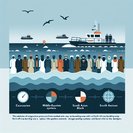
In a significant step to relieve overcrowded child-protection centres in the Canary Islands, the Delegación del Gobierno en Canarias confirmed on 6 November that it has completed and signed 140 case files authorising the relocation of unaccompanied foreign minors to mainland Spain. The transfers are carried out under Article 5 and the first additional provision of Royal Decree 658/2025, which declared a ‘migratory contingency’ in the archipelago after summer arrivals exceeded 4,000 children.
The dossiers – prepared by the sub-delegations in Las Palmas and Santa Cruz de Tenerife and vetted by the juvenile prosecutor – specify each child’s age, nationality, health status and proposed host region. They now await final allocation slots in autonomous-community reception networks. Forty-nine additional files were archived because the youngsters were found to be over 18, and 15 were rejected following negative fiscal reports.
![Spanish Authorities Finalise 140 Transfer Files for Unaccompanied Minors from the Canaries to Mainland Regions]()
Madrid has earmarked €110 million in extraordinary funds to finance the programme, covering accommodation, schooling and specialised trauma care. Regions volunteering reception places will receive €8,500 per child annually, plus a one-off €2,000 integration bonus. The Ministry of Social Rights says the model will form the backbone of a permanent solidarity mechanism to be negotiated with the regions in December.
Corporate immigration advisers note that the Decree also streamlines residence-permit renewals for former unaccompanied minors who enter vocational training – a boon for companies seeking apprentices in shortage occupations. HR departments should monitor BOE updates because the reform introduces automatic work-authorisation endorsements when the child turns 16, eliminating previous red tape.
NGOs welcome the progress but warn that execution is everything: in 2023 more than 300 approved transfers were delayed because host centres failed to adapt facilities in time, prolonging stays on overcrowded islands and exposing children to trafficking risks.
The dossiers – prepared by the sub-delegations in Las Palmas and Santa Cruz de Tenerife and vetted by the juvenile prosecutor – specify each child’s age, nationality, health status and proposed host region. They now await final allocation slots in autonomous-community reception networks. Forty-nine additional files were archived because the youngsters were found to be over 18, and 15 were rejected following negative fiscal reports.

Madrid has earmarked €110 million in extraordinary funds to finance the programme, covering accommodation, schooling and specialised trauma care. Regions volunteering reception places will receive €8,500 per child annually, plus a one-off €2,000 integration bonus. The Ministry of Social Rights says the model will form the backbone of a permanent solidarity mechanism to be negotiated with the regions in December.
Corporate immigration advisers note that the Decree also streamlines residence-permit renewals for former unaccompanied minors who enter vocational training – a boon for companies seeking apprentices in shortage occupations. HR departments should monitor BOE updates because the reform introduces automatic work-authorisation endorsements when the child turns 16, eliminating previous red tape.
NGOs welcome the progress but warn that execution is everything: in 2023 more than 300 approved transfers were delayed because host centres failed to adapt facilities in time, prolonging stays on overcrowded islands and exposing children to trafficking risks.








